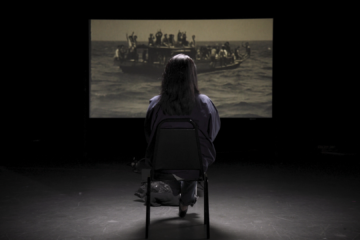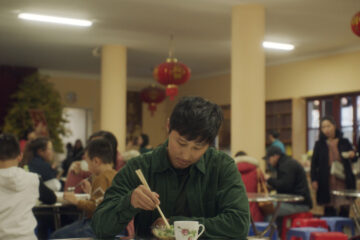The 20th anniversary of Viet Film Fest continues the tradition of celebrating personal Vietnamese experiences through film with the screening of Porcelain. Set in Melbourne, Australia, nine-year-old Hanh mistakes the cunningness of her new “friends” as an act of kindness, forcing her to come to terms with the reality of human betrayal through the loving and tender guidance of her refugee family – especially her father, Quan. Cameron Mitchell, the director of Porcelain, discusses in an exclusive interview how his mother’s refugee experience shaped the film’s narrative and how certain stylistic choices transformed the film to a deeply personal experience.
The story is based on your mother’s experience. How would you describe the process of turning it into a film? What details or elements of the film did you want to focus on the most?
The process of forming the story for Porcelain was heavily inspiring, as this gave me the opportunity to sit down with my mother and truly immerse myself in the stories of her childhood, and learn of the hardships she faced as a refugee child in the early 1980s. Although I had grown up hearing many stories of her past, I quickly came to realise how much I wasn’t aware of, leaving me heavily moved by the tales of a childhood that was so different to my own. I wanted the audience to view the refugee experience through the eyes of a “latch-key kid”, who faces the responsibilities of early maturity, and must navigate her way through a foreign environment, where betrayal and ill will confront her at every turn. I also felt it was crucial to explore the importance of family company, love, and support through such hardships, and how this ties into Vietnamese culture.
Most, or all of the scenes at home takes place in the kitchen when Hanh (Keira Au) does the dishes, when the family eats, and even when Hanh and her dad (David Lam) make a doll together. How would you describe the significance of this place?
The kitchen not only provided Hanh’s character a place of familiarity to share important interactions with her family throughout the film, but to also represent the idea of safe space, where she’s surrounded by those who protect her and understand her, as opposed to the loneliness of the school grounds. Further, it was common for a refugee family in the ‘80s to face financial struggles, and therefore it seemed fitting to restrict the location of the home to one room, to further imply a cramped living environment.
What is the significance of the blinds, or the act of closing them?
The act of closing the blinds relates to one of the first anecdotes my mother had told me when conducting my research for the film. She described how she and her sister would arrive home from school while their parents were still at work, and would be alone until the sun went down, resulting in a bickering exchange between the siblings as to who would close the blinds that night. Remaining authentic to my mother’s story, I knew I had to include this within the film.
Porcelain could be understood in different ways in this film, from a delicate plate to a doll. What is your interpretation of the title?
Absolutely this title relates to both the plate and the doll. However, I’ve always viewed it as the symbolisation of childhood and a child’s mindset. Like anything made from porcelain, it’s fragile and once broken, will never be repaired to its original form. This applies to the fragility of a child’s mindset, and how the effects of such a traumatic experience such as arriving to a new foreign country as a refugee will forever shape the person that child will grow up to be. The cracks formed due to early maturity and facing these hardships during childhood, will show for an entire lifetime, and is evident within my mother and the conversations we’ve shared.
The story seems to be told from a child’s perspective. Hanh is a very reserved child, who does not tend to express her feelings or thoughts vocally. What would be the effects of seeing the world through Hanh’s gaze?
Hanh represents purity and kindness within the world we live in. As all of the characters surrounding her are loud and outspoken, they represent the prejudice and imperfection we see in our world, even today. However, by Hanh moving in silence and purely showing physical acts of kindness, with the intent to right her wrongs, despite the betrayal and hatred she encounters, she represents the ability to learn, grow stronger and discover the faults in those who don’t have her best interests at heart. In other words, seeing the world through Hanh’s gaze represents that no one can take away from your character, only you can do that to yourself.
(Interviewed by Jiyon Byun)
####
Porcelain is part of the “Sharing Dreams in Paris” short film set at Viet Film Fest 2023. It will also precede the pilot episode to Intersections. Porcelain is only available virtually.
Director Statement
Hi! My name is Cam and I’m the writer & director of Porcelain.
As the director, I am proud to present a story that is deeply personal and meaningful to me. The film tells the story of a young Vietnamese refugee girl who is forced to navigate the complexities of a new life in Australia and confront a moral dilemma that challenges her sense of right and wrong.
Porcelain is inspired by the experiences of my own mother, who faced similar struggles as a young refugee in a new country. The film explores themes of cultural identity, displacement, and the difficult choices that immigrants often face when trying to assimilate into a new society.
As a student film created through Swinburne University and produced by OneHouse Productions, Porcelain was a labor of love for all involved. We worked tirelessly to bring this story to life, paying close attention to every detail and nuance to ensure that it was both authentic and engaging. I am incredibly proud of the entire crew, and incredibly grateful for them supporting my vision and giving me the best opportunity to bring this story to life.
Ultimately, my hope is that Porcelain will resonate with audiences and encourage them to think deeply about the challenges that refugees and immigrants face when trying to start a new life in a foreign land. I believe that the film has the power to foster empathy and understanding, and I am grateful for the opportunity to share this story with the world.
VIET FILM FEST 2023
September 30th to October 15th, 2023
Program Schedule and Tickets:
https://vff2023.eventive.org/welcome
Follow @vietfilmfest on Facebook, Instagram, and YouTube



0 Comments